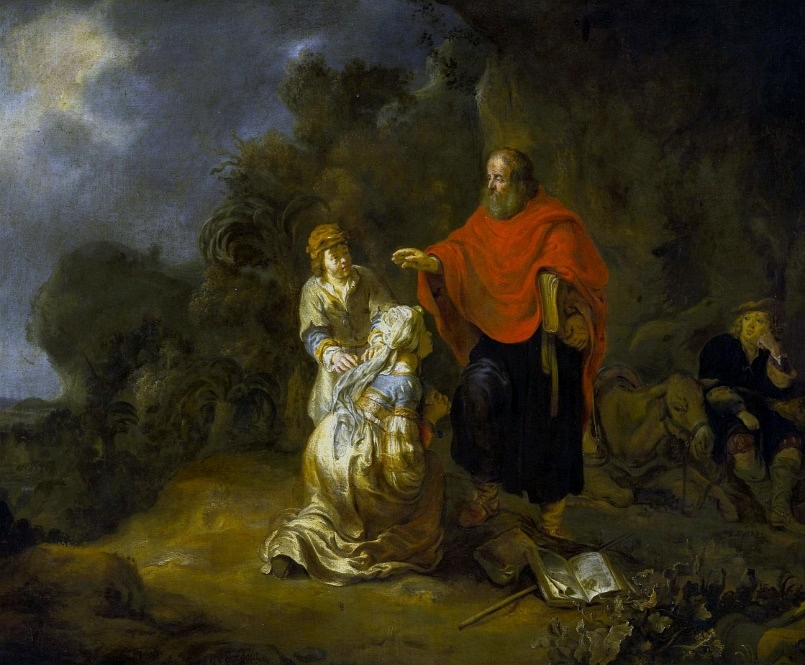Woman of Shunem on:
[Wikipedia]
[Google]
[Amazon]
 The woman of Shunem (or Shunammite woman) is a character in the
The woman of Shunem (or Shunammite woman) is a character in the
1 and 2 Kings
in ''Women's Bible Commentary'', p. 113. The proposal to build a room for Elisha originates with the woman and is supported by her husband (2 Kings 4:9–10).
 The woman of Shunem (or Shunammite woman) is a character in the
The woman of Shunem (or Shunammite woman) is a character in the Hebrew Bible
The Hebrew Bible or Tanakh (;"Tanach"
''Random House Webster's Unabridged Dictionary''. Hebrew: ''Tān ...
. ''Random House Webster's Unabridged Dictionary''. Hebrew: ''Tān ...
2 Kings
The Book of Kings (, '' Sēfer Məlāḵīm'') is a book in the Hebrew Bible, found as two books (1–2 Kings) in the Old Testament of the Christian Bible. It concludes the Deuteronomistic history, a history of Israel also including the books ...
4:8 describes her as a "great woman" (KJV
The King James Version (KJV), also the King James Bible (KJB) and the Authorized Version, is an English translation of the Christian Bible for the Church of England, which was commissioned in 1604 and published in 1611, by sponsorship of K ...
) in the town of Shunem
Shunaam ( he, שׁוּנֵם; in LXX grc, Σουνὰν) was a small village mentioned in the Bible in the possession of the Tribe of Issachar. It was located near the Jezreel Valley, north of Mount Gilboa ().
Shunaam is where the Philistines ca ...
. Her name is not recorded in the biblical text.
Hospitality
According to 2 Kings 4, she showed hospitality to the prophetElisha
Elisha ( ; or "God is my salvation", Greek: , ''Elis îos'' or , ''Elisaié,'' Latin: ''Eliseus'') was, according to the Hebrew Bible, a prophet and a wonder-worker. His name is commonly transliterated into English as Elisha via Hebrew, Eli ...
, constructing a room where he could stay whenever he was in the town. She is childless, but Elisha prophesies that she will have a son. A year later she gives birth to a son.
Raising of her son
2 Kings 4:18–37 relates how, when her son had grown up, he became sick and died. She goes to Elisha for help, and he brings her son back to life.Land restored
The woman of Shunem appears again in 2 Kings 8. At Elisha's advice, she has spent seven years inPhilistia
Philistia (; Koine Greek (LXX): Γῆ τῶν Φυλιστιείμ, romanized: ''gê tôn Phulistieìm''), also known as the Philistine Pentapolis, was a confederation of cities in the Southwest Levant, which included the cities of Ashdod, Ash ...
to avoid a famine, and has come back to find she no longer has possession of her house and land. She appeals to the king (Jehoram Jehoram (meaning " Jehovah is exalted" in Biblical Hebrew) was the name of several individuals in the Tanakh. The female version of this name is Athaliah.
*The son of Toi, King of Hamath who was sent by his father to congratulate David on the oc ...
), and her property is restored to her.
Evaluation
Abraham Kuyper
Abraham Kuyper (; ; 29 October 1837 – 8 November 1920) was the Prime Minister of the Netherlands between 1901 and 1905, an influential neo-Calvinist theologian and a journalist. He established the Reformed Churches in the Netherlands, which upo ...
views the woman of Shunem as a typical example of pious people in Israel having love and respect for the prophets. Kuyper suggests that the narrative indicates her "independence and readiness". Carol Meyers
Carol Lyons Meyers (born 1942) is an American feminist biblical scholar. She is the Mary Grace Wilson Professor Emerita of Religious Studies at Duke University. Meyers' field of research is focused on biblical studies, archaeology in the Middle ...
notes that "unlike virtually all women in biblical narratives, she is not presented as the 'wife' of someone". Claudia Camp
Claudia V. Camp is an American biblical scholar. She is John F. Weatherly Professor of Religion at Texas Christian University. Camp's scholarship emphasizes feminists interpretation and identity formation in the Hebrew Bible and Second Temple perio ...
says that the woman is "both independent and maternal, powerful and pious." Claudia V. Camp1 and 2 Kings
in ''Women's Bible Commentary'', p. 113. The proposal to build a room for Elisha originates with the woman and is supported by her husband (2 Kings 4:9–10).
References
{{reflist Books of Kings people Women in the Hebrew Bible Unnamed people of the Bible 9th-century BCE Hebrew people